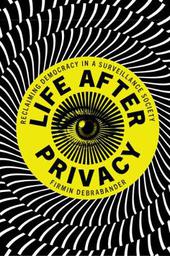
|
Life after Privacy: Reclaiming Democracy in a Surveillance Society
Paperback / softback
Main Details
| Title |
Life after Privacy: Reclaiming Democracy in a Surveillance Society
|
| Authors and Contributors |
By (author) Firmin DeBrabander
|
| Physical Properties |
| Format:Paperback / softback | | Pages:180 | | Dimensions(mm): Height 227,Width 152 |
|
| Category/Genre | Ethics and moral philosophy
Social and political philosophy |
|---|
| ISBN/Barcode |
9781108811910
|
| Classifications | Dewey:342.0858 |
|---|
| Audience | | Professional & Vocational | |
|---|
| Illustrations |
Worked examples or Exercises
|
|
Publishing Details |
| Publisher |
Cambridge University Press
|
| Imprint |
Cambridge University Press
|
| Publication Date |
8 September 2020 |
| Publication Country |
United Kingdom
|
Description
Privacy is gravely endangered in the digital age, and we, the digital citizens, are its principal threat, willingly surrendering it to avail ourselves of new technology, and granting the government and corporations immense power over us. In this highly original work, Firmin DeBrabander begins with this premise and asks how we can ensure and protect our freedom in the absence of privacy. Can-and should-we rally anew to support this institution? Is privacy so important to political liberty after all? DeBrabander makes the case that privacy is a poor foundation for democracy, that it is a relatively new value that has been rarely enjoyed throughout history-but constantly persecuted-and politically and philosophically suspect. The vitality of the public realm, he argues, is far more significant to the health of our democracy, but is equally endangered-and often overlooked-in the digital age.
Author Biography
Firmin DeBrabander is Professor of Philosophy, Maryland Institute College of Art. He has written commentary pieces for a number of national publications, including the New York Times, Washington Post, the Atlantic, LA Times, Salon, Aeon, Chicago Tribune, and The New Republic. Professor DeBrabander is the author of Do Guns Make us Free? (2015), a philosophical and political critique of the guns rights movement.
Reviews'... Life After Privacy: Reclaiming Democracy in a Surveillance Society is an eloquent, compelling call for us to rethink our commitment to privacy by understanding its history and uses. Rather than attempting to double down on a possibly doomed principle, DeBrabander argues that what is really needed is more democracy, and specifically a newly energized commitment to a public sphere that requires open, transparent, and meaningful debate. An indispensable book for our times that does what great political philosophy needs to do - make us question what we mean by our most basic concepts.' William Egginton, author of The Splintering of the American Mind 'In 2020, more so than in 1984, the Big Brother is watching you. But does this really matter? - asks Firmin DeBrabander's pungent new book. Ranging from intellectual history to contemporary economics, from Big Data to Big Politics, from confession to contestation, Life After Privacy argues that we should finally begin caring for the public realm, rather than obsessing about intrusions into the private domain, which is something of a political fiction. If there is a work with the potential to reframe the very terms of the current debate on privacy, it is the one you are now holding in your hands!' Michael Marder, author of Political Categories: Thinking Beyond Concepts 'This book makes accessible a counter-intuitive (perhaps even seemingly-contrarian) argument about privacy that deserves a hearing. Not all readers will agree with DeBrabander's conclusion that privacy is pretty much dead. But this is a view murmured often enough in Silicon Valley to warrant serious attention. DeBrabander understands our skepticisms but skillfully argues that we are inexorably drawn to this conclusion nonetheless. Those who care deeply about privacy, as well as those who look forward to the transparent society, will learn much from this book's subtle arguments. And remember: the best philosophy books are the ones that strike you as implausible by their title but leave you convinced after you've read them.' Colin Koopman, author of How We Became Our Data 'Life After Privacy does a good job of setting our angst in a historical or philosophical setting.' Richard Waters, Financial Times 'This is public philosophy at its best.' Paul Showler, LSE Review of Books
|